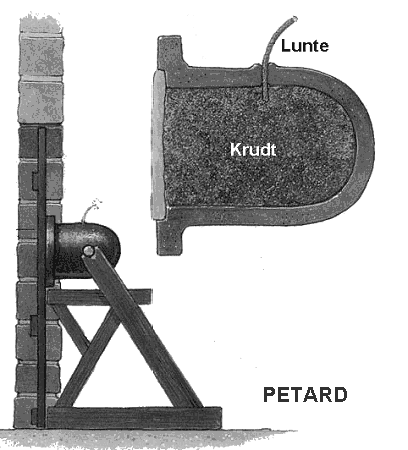 Are publishers hoist with their own petards? (Hey, look, everyone, I said “with” instead of “by”!) That’s the premise of an opinion piece by author Michael Levin on the Forbes blog. Levin suggests that publishers have been blindsided by the ability of authors and agents to bypass them and go direct to the consumer with self-publishing. They have been operating on a system riddled with inefficiencies because for decades there was no incentive to improve—they didn’t have to compete because they were the only real game in town, and now they’ve forgotten how to.
Are publishers hoist with their own petards? (Hey, look, everyone, I said “with” instead of “by”!) That’s the premise of an opinion piece by author Michael Levin on the Forbes blog. Levin suggests that publishers have been blindsided by the ability of authors and agents to bypass them and go direct to the consumer with self-publishing. They have been operating on a system riddled with inefficiencies because for decades there was no incentive to improve—they didn’t have to compete because they were the only real game in town, and now they’ve forgotten how to.
Levin writes:
In no other industry do producers actually wait passively to see what products are suggested to them, instead of doing market research to see what people really want to buy. Yet publishers seldom generate book ideas; instead they wait for literary agents to submit proposals. Houses decide which book to publish based on little more than a gut feeling that says, “I think we can make money selling this!”
Yet the books that publishers choose are almost entirely of zero interest to actual book-buyers. After 9/11, there were a ton of books about 9/11, which nobody bought. Same thing with the Iraq War, the rise of Obama, the economic meltdown, and even, inexplicably, the BP oil spill in the Gulf of Mexico. Or the books are rehashed business lessons, religious truths, sports clichés, motivational babble, exercise fads, weight loss techniques, or pandering to the political left or the right. Who wants these books? Almost no one.
And thanks to the system of unsold returns, publishers bear the cost of bad decisions by bookstores that order more copies than they can sell, on top of their own mistakes. Small wonder that Amazon is threatening to eat their lunch.
This point of view is not exactly a novel one around these parts (pun not intended), but it seems like more and more people are coming to see it as the truth. Hopefully if it gets bandied about enough, publishers will start to listen.
































I think you’re right that the game is changing radically and that many publishers have been caught by surprise by the effect of new technologies. You could also make a case for publishers causing a lot of the ebook pricing dilemma. One of the main reasons their customers expect ebooks to be cheaper is because publishers always based price on format, charging more for brand new book published in hardcover than for one in trade paperback, and more for a trade paper than for a mass market paperback. I understand why they feel a need to price ebooks high to keep profit similar to what it is on hardcover sales, but I don’t think it’s wise to insist that format has nothing to do with price after decades of relying on it for pricing decisions.
I think this article misses the point of what publishers do. Publishers are the final leg of a system of funnels that take a large quantity of inputs (written words) and select those that offer the most value for their imprint and, ultimately, their readers. Agents are pre-selectors. Because there is a huge quantity of unpublished and unpublishable works, the large publishers have based their business on letting agents weed out much of the worst, letting them spend their acquisition editors’ time on what vetted professionals believe meet their needs.
It simply isn’t true that publishers don’t do research and don’t suggest timely ideas to authors. Many publishers do exactly that (many of the anthologies emblazoned with a big-name author, for example, are the result of a publisher wanting to leverage the big author name while providing readers with a similar reading experience.
I’d be the last to argue that the big publishers don’t have some bad habits and don’t publish some bad books. In their insular NY world, they sometimes get into group-think, leading them to, for example, bid outrageous amounts of money by a book with Sarah Palin’s name on it.
Market research always sounds good but would market research have predicted that Americans were hungry for a technical book about a mythical Russian submarine (The Hunt for Red October)? If you ask readers what they want, I suspect they’d say more of the same only better. But books that break out, that really capture the readers’ attention are books that are different–that create new categories and subgenres.
When the web was new, the big buzz word was disintermediation. We were all going to deal directly with suppliers, eliminating the middle-man markeup. Amazon was doomed because they were just adding a middle-man. App stores like Apple offers were silly for the same reason. In fact, we’ve discovered that middle-men can add value. Publishers are middle-men. I’d argue that they, on average, add a huge value to the output we value so much.
Of course, I’m biased.
Rob Preece
Publisher
Middle men *can* add value.
Some add a lot.
Some add little.
In publishing, because of the now-lost gatekeeper function, a lot of the latter got a free ride.
*Those* as the publishers that are getting hoisted.
Pundits need to stop pretending *all* publishers are alike, especially now.
Some are adapting to the ebook disruption and the decline of shelf-space.
Others are not.
Things are about to get very Darwinian.